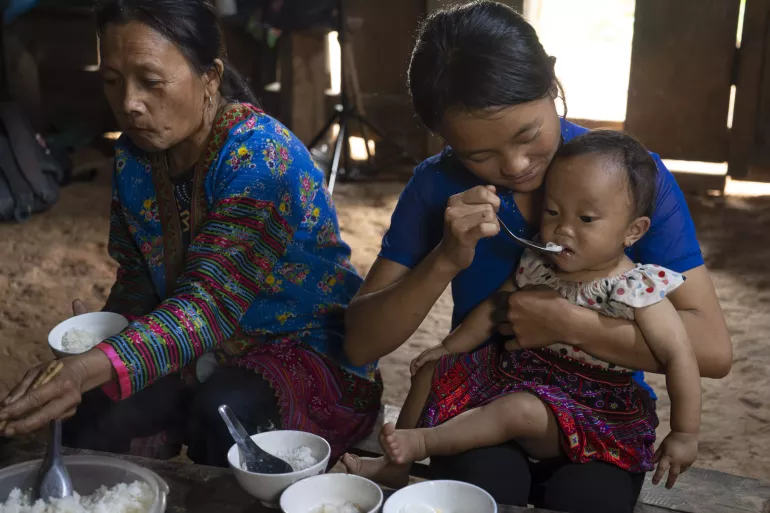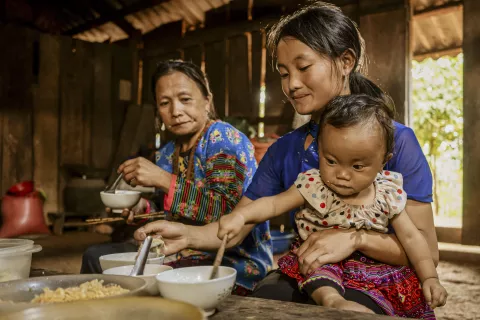New study reveals high sugar and salt content in commercial foods marketed for young children in Southeast Asia
Study across 7 countries shows an alarming 72 per cent of snacks and finger foods marketed at children under 3 contain added sugars and sweeteners

- Available in:
- English
- Tiếng Việt
BANGKOK/HANOI, 18 December 2023 – A new study has revealed high sugar and salt content in commercially produced packaged foods marketed for children aged 6 months to 3 years in Southeast Asia, as well as widespread use of potentially misleading and deceptive labelling and lack of strict regulations around product composition and sale.
The study, supported by UNICEF and partners of the Consortium for Improving Complementary Foods in Southeast Asia (COMMIT), assessed more than 1600 infant cereals, purées, pouches, snacks and ready-to-eat meals marketed at young children in Cambodia, Indonesia, Lao PDR, Malaysia, the Philippines, Thailand and Viet Nam. It also studied consumer behaviours and existing regulations in the seven countries.
The study found that nearly half of the products studied (44 per cent) included added sugars and sweeteners; among snacks and fingers foods, this rose to 72 per cent. When it came to salt content, more than one third of the products studied included more sodium than recommended.
Furthermore, nearly 90 per cent of labels on the products studied included potentially misleading or deceptive claims about their composition. "In Viet Nam, many commercially produced complementary foods (CPCF) on the market are not up to standard in terms of nutritional value, and their labeling practices could potentially mislead parents. There is an urgent need to address significant gaps in the national CPCF regulatory framework," said Lesley Miller, Deputy Representative of UNICEF Viet Nam. "Children and their parents deserve better options."
Commercially produced complementary foods are a common part of the diets of young children in Southeast Asia, with 79 per cent of mothers from urban centres reporting they provide these foods to their young children daily. Across Southeast Asia, sales of commercially produced complementary foods have risen by 45 per cent in the past five years. The study found that about three-quarters of mothers surveyed in Viet Nam stated that they fed their children with CPCF at least once daily. The majority of these mothers purchased CPCF from supermarkets (48 percent) or baby stores (33 percent).
In terms of regulation, the study noted that none of the seven countries had national policies on the composition and labelling of commercially produced complementary foods which follow all international guidance. Several countries were found to have no legal measures to regulate the sugar or salt content of commercially produced complementary foods. Countries with maximum sugar or salt thresholds often only applied them to certain categories, such as cereals or snack foods, and the thresholds were higher than international standards. Sugar intake early in life can lead to cavities, weight gain, and poor eating habits, while high sodium intake can lead to high blood pressure, with impacts that can be lifelong.
“Governments and food producers can, and must, play a stronger role in safeguarding the health of the youngest children,” underlined Debora Comini, UNICEF Regional Director for East Asia and the Pacific. “Good nutrition in the first years of life helps children thrive, fuelling prosperous families, productive workforces and powerful economies. On the other hand, poor nutrition increases the risk of stunting, wasting, micronutrient deficiencies, overweight, obesity and disease, ultimately coming at great cost to children and their families, but also to healthcare systems and economies.”
UNICEF and COMMIT partners are calling for:
- Improved government regulations for commercially produced complementary foods, including prohibiting the use of added sugars and sweeteners, limiting sugar and sodium content, and prohibiting misleading marketing and labelling
- Strict government monitoring and enforcement of national regulations on commercially produced complementary foods
- Support for parents to provide a diverse array of nutritious food to their youngest children and navigate deceptive marketing and labelling practices.
#####
Notes to Editors:
For more information, please contact:
Chiara Frisone, UNICEF East Asia & Pacific, cfrisone@unicef.org, +66 6269 25897;
Nguyen Thi Thanh Huong, UNICEF Viet Nam, ntthuong@unicef.org, +84 904154678
About COMMIT
COMMIT is a joint initiative by the Access to Nutrition Initiative; Alive & Thrive; Helen Keller International; JB Consultancy; School of Food Science and Nutrition, University of Leeds; UNICEF East Asia Pacific Regional Office; and World Food Programme Asia-Pacific Regional Bureau.
It was established to support governments with regulating commercially prepared complementary foods and to protect consumers from inappropriate marketing practices.
Media contacts
About UNICEF
UNICEF promotes the rights and well-being of every child, in everything we do. Together with our partners, we work in 190 countries and territories to translate that commitment into practical action, focusing special effort on reaching the most vulnerable and excluded children, to the benefit of all children, everywhere. For more information about UNICEF and its work for children, visit https://www.unicef.org/vietnam
Follow UNICEF on Facebook, Instagram, X, Youtube, LinkedIn and TikTok




